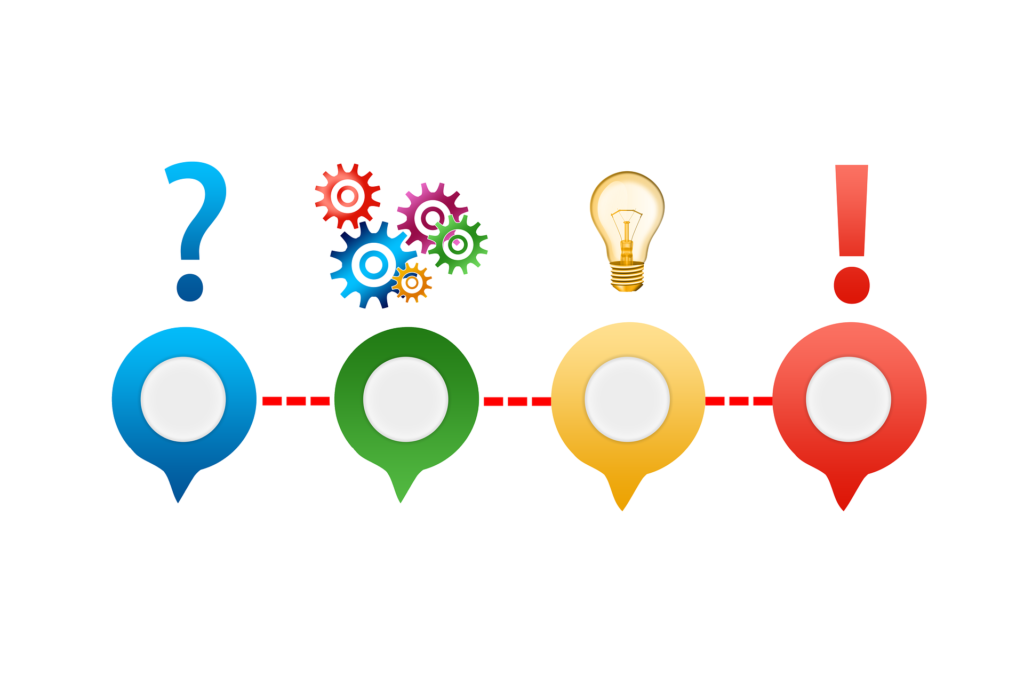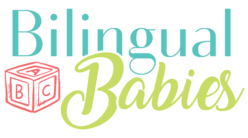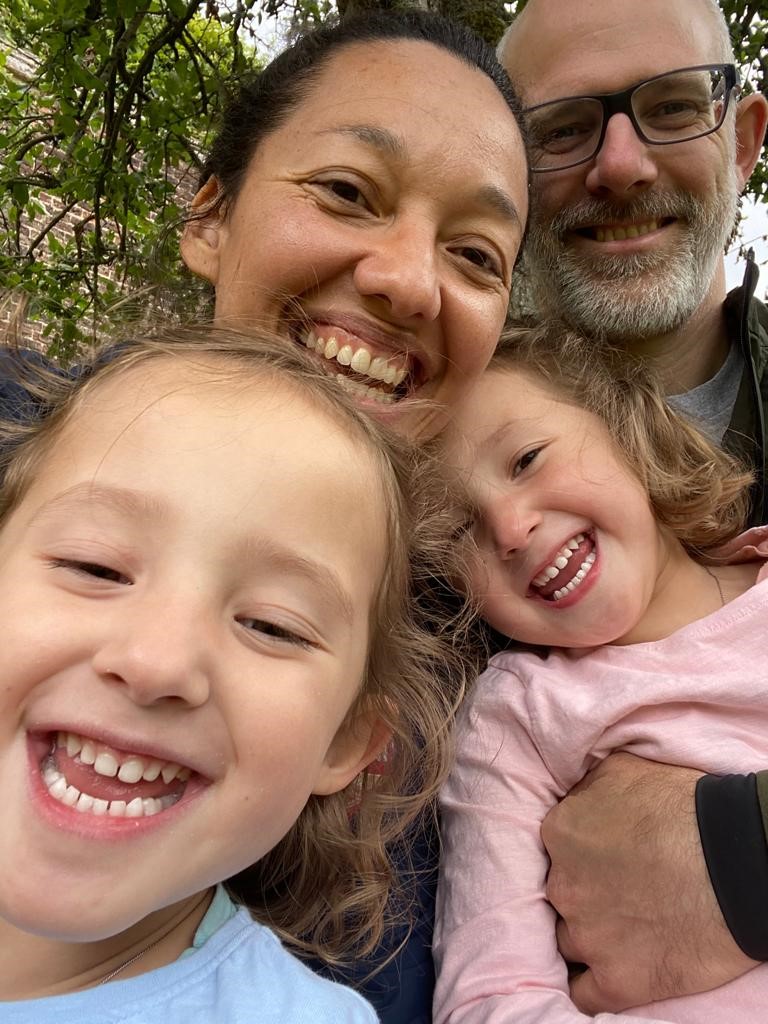Cristina Hollyhead is the founder of the Bilingual Connect Club, a networking site for parents who raise their children with multiple languages. Originally from Germany, she lives in the UK with her husband and their twin girls. When she became a mom in the UK she was searching for a way to connect and meet with other bilingual parents. As there was nothing, she seized the initiative and founded the Bilingual Connect Club, a platform that is fast growing with many more parents from around the world joining on a daily basis.
Mom: German, English
Dad: English
Daughters (5years old): English, German
Veronika: Hi, many thanks for taking the time for the interview today! My first question for you is: who belongs to your family and what do you speak with each other at home?
Cristina: Yes. So, I have two children, Lilly and Ella. They’re twins. So, I have twin girls. They’re are now five years old. I’m German and my husband is English. My children were born in the UK, and then we went to Germany for two years and we just moved back to the UK now. I have always been speaking to Lilly and Ella in German and he always speaks to them in English.
Where to find resources for German
Veronika: And how does that one-parent-one-language approach work on a daily basis? Do you do you use certain resources to promote the minority language in your house?
 Cristina: Yeah, I do a lot. I’m on YouTube all the time, and I’m trying to find ideas, how I can support the children’s German. Now, they’ve started school. German gets stronger and stronger. I signed them up for the German Saturday school and we do have some support during the week. I’ve also started some online class for them on the Monday afternoons. That class is in German, just to keep up the input. I read a lot. I have weeks where we read 80 pages just to broaden the vocabulary and to improve the language. I try a couple of exercises to get them to speak more… For instance, I use the storybook approach. I give them pictures and I ask them to tell me the story based on the pictures. So I ask them “Tell me, what do you see”, just to encourage the active speaking. That works really well for fairy tales. But it also works with poems, for instance. I give them the pictures, and they have to make a poem out of it. That’s what we do. Plus, I read books about how to support language development in children to keep up to date and get ideas.
Cristina: Yeah, I do a lot. I’m on YouTube all the time, and I’m trying to find ideas, how I can support the children’s German. Now, they’ve started school. German gets stronger and stronger. I signed them up for the German Saturday school and we do have some support during the week. I’ve also started some online class for them on the Monday afternoons. That class is in German, just to keep up the input. I read a lot. I have weeks where we read 80 pages just to broaden the vocabulary and to improve the language. I try a couple of exercises to get them to speak more… For instance, I use the storybook approach. I give them pictures and I ask them to tell me the story based on the pictures. So I ask them “Tell me, what do you see”, just to encourage the active speaking. That works really well for fairy tales. But it also works with poems, for instance. I give them the pictures, and they have to make a poem out of it. That’s what we do. Plus, I read books about how to support language development in children to keep up to date and get ideas.
Veronika: That’s interesting. We do a lot of the same tasks and social activities as well, including Saturday school. Since COVID started everything has been online…you mentioned a German class on Monday afternoons. What class is it and where did you find it?
Cristina: I do early musical development with them in German. The course provider, she’s in Germany. I selected that because Ella is incredibly musical. For instance, maths homework I have to sing to her if I want her to listen. So, she’s incredibly musical, and I’ve chosen specifically to do that with her because she just loves to sing. So I figured that I can probably support her language development best by using an activity that she loves doing.
Due to COVID: More events in the heritage countries are offered online
Veronika: That’s interesting in two ways! I feel COVID-19 has “leveled the playing field”. There are a lot more classes etc offered online so regardless of where you are, you can join these classes. For example, my Ella and I joined an interactive play by the Theater der Jungen Welt Leipzig. So we were watching the play in the morning while it was afternoon for the children in Germany, but we could join because it was online. Also, I think it’s key to combine language with something children really like. So, language doesn’t become a “boring thing” they need to study at home, but instead it becomes a means to an end, something that is naturally used when you do something fun.
Cristina: Yes.
Veronika: That’s important. And have you had any challenges that you encountered so far?
Moving back to Germany for a while to promote the minority language
Cristina: Yeah, once or twice it felt hard. And I’m sure I will encounter many more on my journey. The first challenge was the point when they started to talk or to speak. They were about 12 or 14 months when they started to say words. I realized that none of the words they were saying were German, they were all English. And that was the first challenge I encountered. I soon realized that they deliberately chose to speak English so that the start into their language was English and not German. I thought a lot about it and I did a drastic change: we moved to Germany. We went to Germany so that they had a German environment as they started to learn how to speak. So, I wanted to encourage or to lay a foundation… enough for them to actively speak German. It was very drastic.
Cristina: It did. It did work. So, that was a very drastic decision and that was one of the drivers. I wanted to be closer to my family as well and I thought that’s the only opportunity I have; because once they’re in school, I don’t want to change and move them anymore. Yeah, then they moved to Germany, where they went to a bilingual English-German kindergarten. Within three months, they started to switch languages. Then they started to use German actively. And then it went completely out of the run and they only spoke German. My husband was really struggling because he doesn’t speak German that well and he could not understand them anymore. And then, it took about another six months until they started to channel their languages: Mummy, German; Daddy, English.
Traveling to the heritage country is like “taking a language bath”
Veronika: That is very, very interesting because I’ve had a very similar experience just over a much shorter time period. When my Ella was about 2 years old, she would consistently switch to English. When I asked her something, she would respond to me in English. And even though I tried to coax her into speaking German by pretending I didn’t understand or by not complying with a request, it was hard. Then, she and I went to Germany for only four weeks. I had a data collection for a research project in Germany, and I took her along. My husband stayed in the U.S.. So, before we went, she was English dominant. Then, we went to Dortmund, Germany. With my husband in the U.S., Ella was completely immersed in German. Those four weeks completely switched her language dominance to the extent that when we came back, she struggled to speak English to my husband. So, it took 2 to 3 days back in the U.S. and then she was balanced out. Ever since, she’s been speaking German to me. I never had to coax her into speaking German again. From then on, and that was 3 years ago, she has been speaking German to me and English to my husband. Even now, when I catch myself saying something in English to her, she responds in German. So it’s very interesting how that works when you dump them into “language bath” for a certain amount of time.
Cristina: Yes, yes, that was really helpful for Lilly and my Ella. Nonetheless, their German is in their development. It is still behind compared to their peers like my niece and nephews. But they’re now actively speaking German.
Veronika: That’s great. So, ever since, are you making it a point to go back to Germany every year?
A daily challenge: Balancing all languages
 Cristina: If I can, yes, I’ll do so. But now, we are coming up to a year that we have been back in the UK. Obviously, last year was a little bit difficult for everyone to travel and it still is. But we hope that we can soon go again. We were in Germany last summer within the first few weeks, and that was also another developmental push. Afterwards, I could see that they were much more grounded in certain grammatical phenomena and they were applying them more correctly than they had before.
Cristina: If I can, yes, I’ll do so. But now, we are coming up to a year that we have been back in the UK. Obviously, last year was a little bit difficult for everyone to travel and it still is. But we hope that we can soon go again. We were in Germany last summer within the first few weeks, and that was also another developmental push. Afterwards, I could see that they were much more grounded in certain grammatical phenomena and they were applying them more correctly than they had before.
Veronika: Interesting! What was the second challenge that you mentioned?
Cristina: Yeah, so when we came back… the challenge is we’re back in the UK and obviously, English is the majority language. So keeping their German up is a challenge or work-in-progress. I can see that their English is getting stronger by the day. In the last six months since they started school in September, English has come up a lot, and I’m coming to the point where it’s beautiful to see… I can see that they’re gradually catching up to their peers here in school. So, they’re losing some words in German and maybe a bit of their German accent. They’re losing that. There’s more and more English or British English. That’s very nice to see. But it also comes at the expense of German. Now they are in school all day. So the longer they’re in school, the more they start mixing in a lot of English words when they speak German. I think, it is totally normal, but nonetheless when they speak to me, the structure is German. They’re dropping in a lot of English nouns that they must know from school into that German grammatical structure. I’m not so concerned about that. For example, we just had holidays and I spent every day with them. So I was able to provide a lot of input and exposure to German. I think they probably had 48 hours with just German which helped make it stronger again. So, that’s the main challenge. I think now, it’s about keeping up with developing their minority language because German hasn’t matured yet. Their grammar hasn’t completely matured yet and they still mix up tenses, pronouns like dir/dich and so on.
The importance of being a strong role model in German
 Veronika: I’m encountering the same things. Grammatical forms like dir/dich, mir/mich etc. are still tricky for my Ella. Also, sometimes she uses an English sentence structure and fills it with German words. It’s interesting to see language transfer in action. But then I’m trying to counterbalance that by being a strong monolingual role model.
Veronika: I’m encountering the same things. Grammatical forms like dir/dich, mir/mich etc. are still tricky for my Ella. Also, sometimes she uses an English sentence structure and fills it with German words. It’s interesting to see language transfer in action. But then I’m trying to counterbalance that by being a strong monolingual role model.
Cristina: Yes, the interference from English, from the majority language. About a year ago, I was practicing German songs with them because, in comparison to my niece and nephews, they did not pronounce some of the sounds correctly. So, I was practicing with them the sharp sounds, like /sh/ and /ch/. So, we did a lot of phonics and phonic signs. Now, they pronunciation is much clearer. When they say a word, people can understand them much better. I had instances where they were speaking with my parents and my parents couldn’t understand what they were saying because the pronunciation was off… But we did a lot of phonics and, I find, that now it is much better.
Veronika: What resources did you use? Or do you still use to promote things like pronunciation?
Resources to help with pronunciation
Cristina: I have been using YouTube a lot. I YouTube so many things. I found pretty good exercises from a speech therapist, and she gives you exercises that you can do at home regularly. For example, she practices umlauts as well as sounds like /d/ and /t/. She gives exercises to strengthen the phonological awareness so they’re able to hear the differences between D/T and M/N. I try to do that with the girls.
I closely followed the YouTube channel Sprechstübchen which has has great games and exercises for children – especially young children of 3+ years. You can very quickly learn and do the exercises with your children. In addition to Sprechstübchen, I watched the YouTube channel of Beate Müller. In some videos she works with children and I found it very useful.
Veronika: I can see how that can be really helpful, especially if you incorporate those exercises into their day in a playful way. So they don’t feel like they are doing some sort of training but it is more perceived as a game.
Cristina: Exactly! ,
The Bilingual Connect Club: A community for bilingual parents
 Veronika: You actually developed an interest in bilingual parenting to the extent that you set up a support network for parents to find other families who are raising bilingual children. Can you tell me more about that network and how that got started?
Veronika: You actually developed an interest in bilingual parenting to the extent that you set up a support network for parents to find other families who are raising bilingual children. Can you tell me more about that network and how that got started?
Cristina: Yes. So, when we moved back to the UK again, we moved to a different area from where we had lived before. And so, I had to build my network again. You do need a support network for raising bilingual children. In our case, I don’t have parents living close by and I’m the only German speaker. I thought I needed help to raise them with two languages. As I was trying to plan Lily and Ella’s bilingual journey, I thought I actually do need more support. First, I need a German school. Yes, that’s good. But nonetheless, I need a little more exposure in German for them on a regular basis. And so, I had to make friends again. I was looking around. Then I thought actually it might be a good idea to have a platform where I can meet other parents that live down the road. Then, I found a technology that supported that idea and I started to host that platform and build such a network. So that was the begging of the bilingualconnect.club.
In the beginning, the main benefit of the platform was that I could see which other German parents live close by. And obviously the platform grew and it is set up to work everywhere. It needs a lot of people but once it reached a critical mass, it can work globally. Since I’m located in the UK, I have a strong network of bilingual parents here who have also joined. For example, I’m very, very, very pleased to have found someone through the network, a friend now who speaks German. She has a little boy. The little boy is a year older than Lily and Ella, but we can actually walk over to their house.
So such a network can enrich your life outside of the virtual environment as well. And there are more and more parents from around the world who are joining the BilingualConnect Club.
Veronika: Nice! So other parents in and outside of the UK can also join the BilingualConnect platform and make new bilingual friends in their area.
Anyone can join and it’s free!
 Cristina: Yes. Everyone can join it and I would be very happy if more people would join the network; because it is a great way to make new friends and connections. So what I also hope once COVID-19 taper off… is to develop BilingualConnect as a platform or hub for playgroups. Then people can see, “Oh, great. Here’s a playgroup for me. And oh yeah, I just know they are actually in my area”. And Saturday schools can come on and show where they’re based. So, I hope that in the future, it will be a big community, a support network to raise bilingual children.
Cristina: Yes. Everyone can join it and I would be very happy if more people would join the network; because it is a great way to make new friends and connections. So what I also hope once COVID-19 taper off… is to develop BilingualConnect as a platform or hub for playgroups. Then people can see, “Oh, great. Here’s a playgroup for me. And oh yeah, I just know they are actually in my area”. And Saturday schools can come on and show where they’re based. So, I hope that in the future, it will be a big community, a support network to raise bilingual children.
Veronika: I think it’s a really great idea. It actually seems to have picked up. I looked earlier today and saw that there are a bunch of people on that network already. I’m sure once COVID is over, it may grow even further.
Cristina: Yes, hopefully.
Advice for parents: Get a support network and …
Veronika: With all that knowledge in bilingual parenting, what advice would you give to other parents who are either thinking about raising bilingual children or are already on their bilingual journey? What would you tell them?
Cristina: Hmm, I’ve read also a lot of research about raising bilingual children. I just wanted to have a good knowledge base to make informed decisions. But despite all of the reading, I underestimated how important it is to have a support network, especially if you are the only minority language speaker. So, what I would probably give as an advice; is this: if you can, don’t do it alone. Try to connect to other parents. It doesn’t mean that you have to have a lot of play dates. I think even a connection to another bilingual parent, even if it’s not your language combination, might help because it’s someone else who understands you or who knows how frustrating it can be when a child answers in the majority language. I think it’s important to have someone who understands the situation.
… always remember: you are doing a great job!
 So if you are frustrated you have someone who understands. I read a lot. I’m also in a Facebook group and I see parents that are really disheartened because the child answers in the majority language or doesn’t pick up the minority language as they had hoped for. To those parents: I think you’re doing a great job because understanding or being passive bilingual is also a massive achievement and a gift that you give to your children. We all have seen that visiting the home country can just boost the language, and it’s the same with a passive bilingual child. They can activate the language. Even if a child is 18 already and then decides to go to the heritage country, he or she can switch on the language in a matter of weeks. So, don’t be disheartened. Continue! That’s my advice. And, most of all, connect with other parents so you’ll find the support that is right for your situation.
So if you are frustrated you have someone who understands. I read a lot. I’m also in a Facebook group and I see parents that are really disheartened because the child answers in the majority language or doesn’t pick up the minority language as they had hoped for. To those parents: I think you’re doing a great job because understanding or being passive bilingual is also a massive achievement and a gift that you give to your children. We all have seen that visiting the home country can just boost the language, and it’s the same with a passive bilingual child. They can activate the language. Even if a child is 18 already and then decides to go to the heritage country, he or she can switch on the language in a matter of weeks. So, don’t be disheartened. Continue! That’s my advice. And, most of all, connect with other parents so you’ll find the support that is right for your situation.
Veronika: Yeah, I think it’s a very important thing. It takes a village to raise a child, especially a bilingual one.
Cristina: Yes, exactly.
Veronika: Alright! Thank you very much for the interview and for sharing your bilingual journey!



